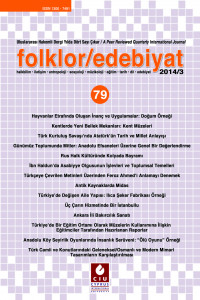Öz
İbn Haldun’un “sosyal bilimlerin 14. yüzyıldaki öncüsü” olarak gösterilmesinin temel nedeni,
onun, toplumsal olayları incelerken kullanmış olduğu bilimsel yöntemdir. Bu yöntem anlayışı
toplumsal olay ve olgular arasındaki nedensellik ilişkisini keşfetme çabası ve tümevarımcılık
olarak özetlenebilir. Makalemizde, İbn Haldun’un incelemiş olduğu çok sayıda toplumsal
değişken arasından asabiyye olgusuna odaklanılmış, İbn Haldun’un asabiyye olgusunun toplumsal
belirleyicileri ve sonuçlarına ilişkin sosyolojik saptamaları konu edinilmiştir. Başlıca literatür
kaynağı olarak Mukaddime’nın Türkçeye yönelik iki ayrı çevirisinden yararlanılmıştır. Sonuç
bölümüne gelindiğinde, İbn Haldun’a göre asabiyye olgusunun devlet kurmak, ülke savunması
ve başka kavimlere üstünlük sağlamak biçiminde toparlayabileceğimiz üç temel toplumsal
işlevi bulunmaktadır. Bununla birlikte İbn Haldun, asabiyye olgusunun temelindeki toplumsal-ekonomik
gerçekliği de inceleme kapsamına almaktadır.
Anahtar Kelimeler
Kaynakça
- gürkan, ülker, Hukuk Sosyolojisi Açısından İbn Haldun, ankara üniversitesi hukuk Fakültesi dergisi, 24(1), s. 223-246, 1967.
- ibn haldun, Mukaddime, 1. Cilt, (Çeviren: Süleyman uludağ), dergah yayınları, istanbul, 2009.
- ibn haldun, Mukaddime, 1. Cilt, (Çeviren: Turan dursun), kaynak yayınları, istanbul, 2013.
- hassan, ümit, İbn Haldun, Metodu ve Siyaset Teorisi, doğu-batı yayınları, ankara, 2010.
- yıldız, Mustafa, İbn Haldun’un Tarihselci Devlet Kuramı, Felsefe ve Sosyal bilimler dergisi, Sayı:10, s.25-55, 2010.
Öz
The primary reason why Ibn Khaldun is regarded as “the pioneer of the 14th Century
Sociology”, is the scientific methodology he adopted so as to examine and describe social events.
This methodological approach can be summarized as a combination of induction and the attempt
to understand the causal relationship between social events and phenomena. For the purpose
of the present study, the asabiyyah concept was chosen as the focal concern out of numerous
social variables that Ibn Khaldun examined, and his sociological findings on social determiners,
and results of this particular concept were discussed. The researcher used two translations of
Muqaddimah as the primary sources. To conclude, the asabiyyah serves three basic social
functions, namely founding a state, protecting the country, and ruling over other tribes. Moreover,
Ibn Khaldun also investigates the socio-economic reality which underlies the asabiyyah.
Anahtar Kelimeler
Kaynakça
- gürkan, ülker, Hukuk Sosyolojisi Açısından İbn Haldun, ankara üniversitesi hukuk Fakültesi dergisi, 24(1), s. 223-246, 1967.
- ibn haldun, Mukaddime, 1. Cilt, (Çeviren: Süleyman uludağ), dergah yayınları, istanbul, 2009.
- ibn haldun, Mukaddime, 1. Cilt, (Çeviren: Turan dursun), kaynak yayınları, istanbul, 2013.
- hassan, ümit, İbn Haldun, Metodu ve Siyaset Teorisi, doğu-batı yayınları, ankara, 2010.
- yıldız, Mustafa, İbn Haldun’un Tarihselci Devlet Kuramı, Felsefe ve Sosyal bilimler dergisi, Sayı:10, s.25-55, 2010.
Ayrıntılar
| Diğer ID | JA67PG38FN |
|---|---|
| Bölüm | Araştırma Makaleleri - Research Articles |
| Yazarlar | |
| Yayımlanma Tarihi | 1 Ekim 2014 |
| Yayımlandığı Sayı | Yıl 2014 Cilt: 20 Sayı: 79 |
Derginin yayım dili Türkçe ve İngilizce’dir, ayrıca Türkçe de olsa tüm basılan makalelerin başlık, öz ve anahtar sözcükleri İngilizce olarak da makalede bulunur. Hakemlerden onay almış Türkçe makaleler için 750-1000 sözcükten oluşan genişletilmiş özet (extended summary) gereklidir. Elektronik çeviriler kabul edilmez.
Dergi TR-Dizin, Web of Science (ESCI), DOAJ ile diğer pek çok dizin tarafından taranmaktadır. Scimagoe quartile değeri: Q2 'dir:
TR DIZIN 2020 Etik Kriterleri kapsamında, dergimize 2020 yılından itibaren etik kurul izni gerektiren çalışmalar için makalenin yöntem bölümünde ilgili Etik Kurul Onayı ile ilgili bilgilere (kurul-tarih-sayı) yer verilmesi gerekecektir. Bu nedenle dergimize makale gönderecek olan yazarlarımızın ilgili kriteri göz önünde bulundurarak makalelerini düzenlemeleri önemle rica olunur.
Alan Editörleri/ Field Editörs
Halkbilimi/Folklore
Prof.Dr. Hande Birkalan-Gedik (JohannWolfgang-Goethe İniversitet-birkalan-gedik@m.uni-frankfurt.de)
Prof.Dr. Ali Yakıcı (Gazi Üniversitesi-yakici@gazi.edu.tr)
Prof.Dr. Aynur Koçak (Yıldız Teknik Üniversitesi-nurkocak@yildiz.edu.tr)
Prof.Dr. Işıl Altun (Regensburg Üniversitesi/Kocaeli Üniversitesi-İsil.Altun@zsk.uni-regensburg.de)
Doç.Dr. Ahmet Keskin (Samsun Üniversitesi-ahmet.keskin@samsun.edu.tr)
Edebiyat/Literature
Prof.Dr. Abdullah Uçman (Mimar Sinan Güzel Sanatlar Üniversitesi -emekli-29 MayısÜniversitesi-abdullahucman@29mayis.edu.tr
Prof. Dr. Ramazan Korkmaz (Ardahan Üniversitesi-emekli-Kafkasya Üniversiteler Birliği -KÜNİB-r_korkmaz@hotmail.com)
Prof.Dr. Emel Kefeli (Marmara Üniversitesi-emekli-İstanbul 29 Mayıs Üniversitesi-ayseemelkefeli @gmail.com)
Prof.Dr. Zekiye Antakyalıoğlu ( İstanbul Aydın Üniversitesi-zekabe@hotmail.com)
Antropoloji/Anthropology
Prof.Dr. Hanife Aliefendioğlu (Doğu Akdeniz Üniversitesi-hanife.aliefendioglu@emu.edu.tr)
Prof. Dr. Şebnem Pala Güzel (Başkent Üniversitesi-sebnempa@baskent.edu.tr)
Prof.Dr. Derya Atamtürk Duyar (İstanbul Üniversitesi-datamturk@istanbul.edu.tr)
Prof.Dr. Meryem Bulut (Ankara Üniversitesi-meryem.bulut@gmail.com)
Dil-Dilbilim/Language-Linguistics
Prof.Dr. Nurettin Demir (Hacettepe Üniversitesi-demir@hacettepe.edu.tr)
Prof. Dr. Aysu Erden (Maltepe Üniversitesi-aysuerden777@gmail.com)
Prof.Dr. Sema Aslan Demir (Hacettepe Üniversitesi-semaaslan@hacettepe.edu.tr)


